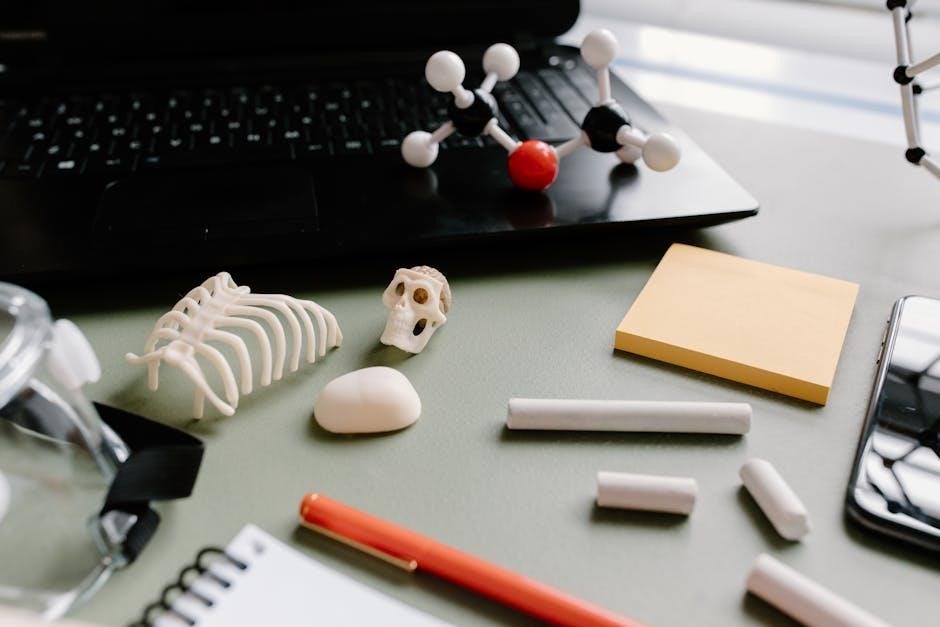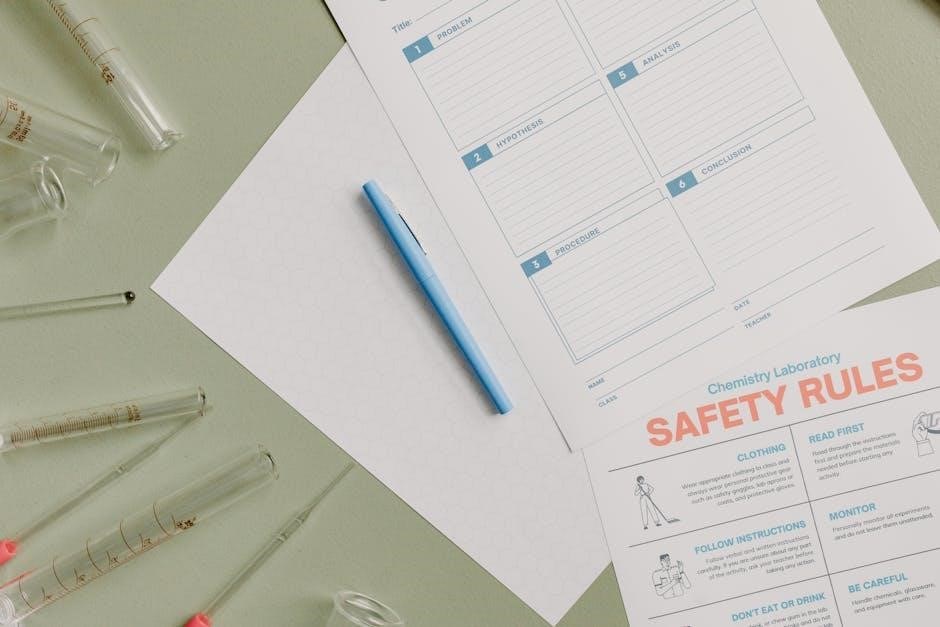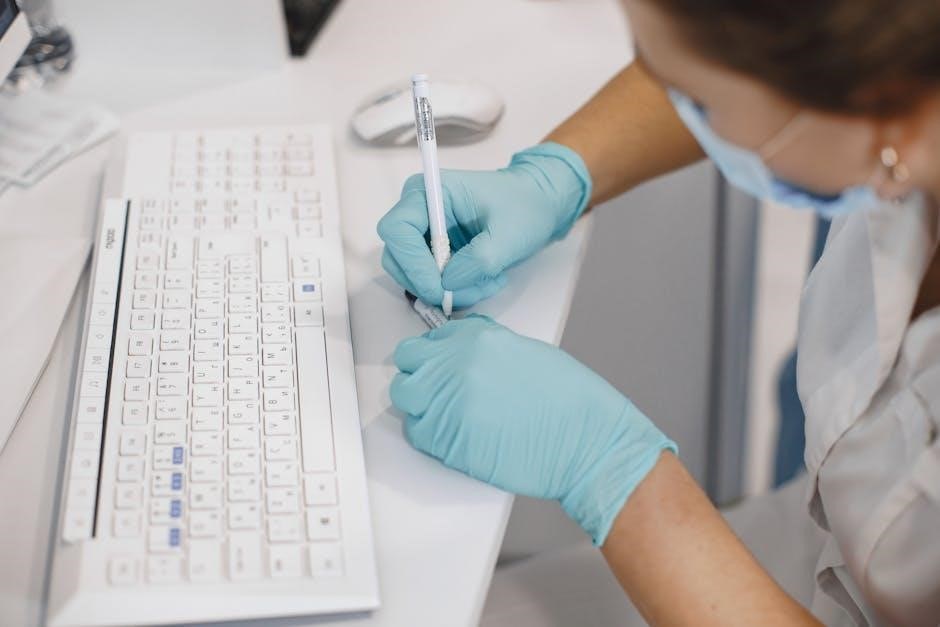fundamentals of nursing pdf notes
- Published
- in PDF
Nursing fundamentals serve as the cornerstone of nursing education‚ providing essential knowledge and skills for patient care. These resources‚ often available as free PDF notes‚ cover core concepts such as infection control‚ vital signs assessment‚ and patient communication. They are designed to equip students with the foundational understanding necessary for effective nursing practice‚ ensuring a solid starting point for their professional journey in healthcare.
1.1 Definition and Scope of Nursing
Nursing is a healthcare profession focused on the care of individuals‚ families‚ and communities to promote health‚ prevent illness‚ and manage conditions. Its scope encompasses a holistic approach‚ addressing physical‚ emotional‚ and social needs. Nurses act as caregivers‚ educators‚ and advocates‚ working in diverse settings like hospitals‚ clinics‚ and community health. The role is pivotal in supporting patients’ well-being and improving quality of life.
1.2 Importance of Nursing in Healthcare
Nursing plays a vital role in healthcare‚ serving as the backbone of patient care. Nurses are primary caregivers‚ ensuring patient safety‚ administering treatments‚ and monitoring progress. They provide emotional support‚ educate patients on health practices‚ and act as advocates. Their role is crucial in improving patient outcomes‚ managing chronic conditions‚ and enhancing overall well-being‚ making nursing indispensable in the healthcare system. Their dedication directly impacts quality of life and healthcare delivery.

Historical Evolution of Nursing
Nursing has evolved from ancient care practices to a professional discipline. Early nursing was rooted in religious and community care‚ advancing with Florence Nightingale’s reforms‚ establishing it as a formal profession focused on compassion‚ science‚ and patient-centered care.
2.1 Ancient and Medieval Nursing Practices
Ancient nursing practices were deeply rooted in spiritual and religious care‚ with early healers often associated with temples and religious orders. In medieval times‚ monasteries became centers for caregiving‚ providing shelter and basic medical aid to the sick. Nursing during these periods was largely informal‚ with women playing a significant role in caring for the ill and injured. These early practices laid the groundwork for the development of organized nursing care.
2.2 Modern Nursing: Florence Nightingale and Beyond
Florence Nightingale revolutionized nursing during the Crimean War‚ introducing sanitation practices and statistical reporting to improve patient care. Her work laid the foundation for modern nursing‚ emphasizing compassion‚ professionalism‚ and evidence-based care. Since then‚ nursing has evolved with advancements in technology‚ specialized roles‚ and a focus on holistic patient-centered approaches‚ transforming it into the diverse and vital profession it is today.

Core Concepts in Nursing Practice
Core concepts in nursing practice include vital signs assessment‚ infection control‚ and patient communication. These foundational elements ensure safe‚ effective‚ and compassionate care‚ forming the basis of nursing interventions.
3.1 Vital Signs and Their Assessment
Vital signs are critical indicators of a patient’s health status‚ including temperature‚ pulse‚ respiration‚ and blood pressure. Accurate assessment of these signs is essential for detecting abnormalities‚ guiding interventions‚ and monitoring patient progress. Nursing PDF notes emphasize the importance of precise measurement techniques and documentation to ensure comprehensive care and timely responses to changes in a patient’s condition.
3.2 Infection Control and Hygiene
Infection control is a cornerstone of nursing practice‚ focusing on preventing the spread of pathogens. Proper hand hygiene‚ use of personal protective equipment‚ and sterilization techniques are emphasized in nursing PDF notes. These measures ensure a safe environment for both patients and healthcare workers‚ reducing the risk of infections and promoting overall well-being.

Nursing Process and Patient Assessment
The nursing process involves systematic steps to assess‚ diagnose‚ plan‚ implement‚ and evaluate patient care. PDF notes emphasize patient assessment techniques like physical exams and data collection to guide care.
4.1 Steps of the Nursing Process
The nursing process consists of five key steps: assessment‚ diagnosis‚ planning‚ implementation‚ and evaluation. Assessment gathers patient data‚ diagnosis identifies health issues‚ planning sets goals‚ implementation executes care‚ and evaluation reviews outcomes. PDF notes highlight these steps as essential for structured‚ patient-centered care‚ ensuring nurses systematically address health needs and achieve optimal results‚ as outlined in fundamental resources.
4.2 Patient Assessment Techniques
Patient assessment techniques involve systematic methods to gather data about a patient’s health status. These include physical examinations‚ vital sign measurements‚ and health histories. Observation‚ palpation‚ percussion‚ and auscultation are key skills. PDF notes emphasize the importance of accurate documentation and the use of assessment tools to identify health issues‚ ensuring personalized and effective care plans.

Nursing Education and Curriculum
Nursing education is structured to equip students with essential skills and knowledge. Curricula often include foundational courses like anatomy and pharmacology‚ with resources such as PDF notes and open educational materials widely used to support learning and align with standardized nursing education frameworks and test plans.
5.1 Types of Nursing Education
Nursing education encompasses various programs‚ including GNM‚ BSN‚ and diploma courses‚ each tailored to different career paths. These programs integrate theoretical knowledge with practical training‚ ensuring comprehensive skill development. PDF notes and study guides play a crucial role in supplementing classroom learning‚ offering accessible resources for self-study and exam preparation‚ particularly for standardized tests like the NCLEX-PN‚ ensuring students are well-prepared for their professional roles.
5.2 NCLEX Test Plan and Preparation
The NCLEX test plan outlines the exam structure‚ focusing on patient safety‚ health promotion‚ and pharmacological interventions. Preparation resources‚ including PDF study guides and practice questions‚ are widely available. These materials align with the latest test plans‚ ensuring candidates are well-prepared to demonstrate their competency. Effective study strategies and access to updated resources are essential for success in this critical licensure exam for nursing professionals.

Legal and Ethical Considerations
Understanding legal standards and ethical principles is crucial in nursing. This includes patient rights‚ confidentiality‚ and informed consent‚ ensuring safe‚ compassionate care while protecting nurses legally and morally.
6.1 Patient Rights and Confidentiality
Patient rights and confidentiality are fundamental principles in nursing‚ ensuring respect and dignity for all individuals. Nurses must adhere to ethical guidelines‚ maintaining patient privacy and upholding legal standards. This includes securing personal health information and obtaining informed consent. Breaches of confidentiality can lead to legal consequences‚ emphasizing the importance of strict adherence to these ethical and legal frameworks in daily practice.
6.2 Ethical Dilemmas in Nursing
Nursing often involves complex ethical dilemmas‚ such as end-of-life decisions‚ resource allocation‚ and cultural or religious conflicts. Nurses must balance patient autonomy with beneficence‚ non-maleficence‚ and justice. Ethical frameworks guide decision-making‚ but situations remain challenging. Education and support systems help nurses navigate these moral challenges‚ ensuring compassionate and ethical care while maintaining professional integrity and patient trust.

Documentation and Patient Records
Accurate documentation is crucial in nursing‚ ensuring continuity of care and legal compliance. Patient records include medical history‚ diagnostic results‚ and treatment plans‚ aiding clear communication among healthcare providers.
7.1 Importance of Accurate Documentation
Accurate documentation is vital for ensuring patient safety‚ continuity of care‚ and legal protection. It provides a clear record of patient history‚ treatments‚ and outcomes‚ aiding healthcare providers in making informed decisions. Proper documentation also supports accountability and communication among the healthcare team‚ reducing errors and improving overall patient outcomes significantly. It is a fundamental skill emphasized in nursing education and practice.
7.2 Types of Nursing Records
Nursing records include various types such as progress notes‚ care plans‚ medication administration records‚ and discharge summaries. These documents provide a comprehensive overview of patient care‚ ensuring consistency and clarity. They are essential for tracking patient progress‚ facilitating communication among healthcare providers‚ and maintaining legal standards. Understanding these records is a key component of nursing education‚ as highlighted in many fundamentals of nursing PDF notes available online.

Current Trends in Nursing
Current trends in nursing emphasize technological advancements‚ evidence-based practices‚ and holistic patient care. These innovations enhance patient outcomes and streamline nursing workflows‚ as detailed in many PDF notes.
8.1 Technological Advancements in Nursing
Technological advancements are revolutionizing nursing practice‚ enhancing patient care and efficiency. Electronic health records (EHRs) streamline data management‚ while telehealth expands access to remote care. Wearable devices and AI-driven tools enable real-time monitoring and personalized interventions. These innovations‚ detailed in PDF notes‚ empower nurses to deliver high-quality care‚ improve outcomes‚ and adapt to evolving healthcare demands with precision and effectiveness.
8.2 Evidence-Based Nursing Practices
Evidence-based nursing practices integrate research findings into clinical decisions‚ ensuring care is grounded in current‚ reliable evidence; These practices‚ detailed in PDF notes‚ emphasize the use of systematic reviews and clinical guidelines to improve patient outcomes. By adopting evidence-based approaches‚ nurses can deliver standardized‚ high-quality care‚ reducing variability and enhancing safety in healthcare settings while staying updated with the latest advancements in nursing science and practice.

Preparing for Nursing Exams
Effective preparation for nursing exams requires structured study strategies and access to reliable resources. PDF notes offer concise‚ organized content‚ covering essential topics and practice questions to enhance exam readiness and success.
9.1 Study Strategies for Nursing Students
Effective study strategies for nursing students involve active learning techniques‚ such as creating concept maps and flashcards. Utilizing PDF notes and study guides helps organize knowledge. Prioritizing topics based on exam weight and practicing NCLEX-style questions enhances readiness. Regular review sessions and group discussions foster deeper understanding. Incorporating evidence-based practices and staying updated with the latest nursing research ensures comprehensive preparation for exams and real-world application.
9.2 Resources for Exam Preparation
Accessing high-quality resources is crucial for nursing exam preparation. Free PDF notes and study guides provide comprehensive coverage of fundamental concepts. NCLEX-RN and NCLEX-PN test plans offer insights into exam formats. Online platforms and educational websites supply practice questions and evidence-based study materials. Utilizing these resources ensures a well-rounded preparation‚ helping students achieve success in their nursing exams and future careers.
Free Nursing Resources
Free nursing resources‚ such as PDF notes and study guides‚ provide accessible learning materials for students‚ covering essential topics like patient care and professional development effectively.
10.1 Open Educational Resources (OER)
Open Educational Resources (OER) offer free‚ adaptable learning materials for nursing students‚ including PDF notes and textbooks. These resources are developed under Creative Commons licenses‚ enabling widespread access and customization. They cover fundamental topics like patient assessment‚ infection control‚ and nursing practices‚ aligning with curriculum standards. OER promotes equity in education‚ ensuring all students can access high-quality materials regardless of financial status.
10.2 PDF Notes and Study Guides
PDF notes and study guides are indispensable tools for nursing students‚ providing concise summaries of key concepts. They cover topics like vital signs‚ infection control‚ and patient assessment‚ often structured week-wise for organized learning. These resources are easily downloadable and accessible‚ making them ideal for exam preparation. They also include practice questions and evidence-based content‚ helping students achieve better scores and a deeper understanding of fundamentals.
Nursing fundamentals are essential for building a strong foundation in patient care. PDF notes and study guides provide accessible‚ concise learning materials‚ aiding students in mastering key concepts and preparing for exams effectively.
11.1 The Future of Nursing Education
The future of nursing education emphasizes digital learning and open educational resources (OER). With advancements in technology‚ nursing curricula now incorporate virtual simulations and evidence-based practices‚ preparing students for modern healthcare challenges. Resources like NCLEX test plans and PDF notes ensure accessibility‚ fostering a well-prepared nursing workforce. This evolution ensures nursing education remains innovative‚ student-centric‚ and aligned with global healthcare demands.
11.2 Final Tips for Nursing Students
Success in nursing requires dedication‚ critical thinking‚ and effective study habits. Utilize free PDF notes and resources to reinforce learning. Stay organized‚ prioritize tasks‚ and practice consistently. Engage in active learning strategies and seek mentorship for guidance. Build strong communication skills and emphasize patient-centered care; Regularly review NCLEX test plans to ensure exam readiness. Embrace lifelong learning to stay updated on evidence-based practices and advancements in healthcare.
